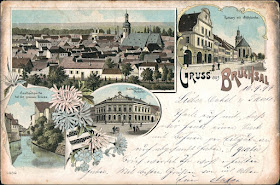Lost cities 2:7
About this series: Until 1960, all my direct ancestors from the great-great-grandparents through to my parents lived in towns and cities. After November 1972 nobody did, as my parents and grandparents had embraced the car-dependent life in the sticks and the previous city-dwelling generations had all died out by then. When I escaped the countryside and moved to various university cities I discovered that I had been missing out on the opportunities and structured environments of cities since we moved away from Würzburg when I was 5 years old. I started to strongly identify as a town mouse, even though I had to re-learn city life (which is why I didn't dare moving to really big cities like Berlin.) In this series I am reclaiming my urban heritage in exploring/presenting some of the towns and cities that my DNA passed through within the last two centuries. As the four generations before me have mostly been quite mobile (often starting with employment in the nascent railways), there are many towns and cities popping up in my family tree, including quite a few where I wouldn't mind living myself.
When I started getting obsessed with the musical biography of Heinrich our family cello and the eponymous cellist, I also got in touch with the descendants of Maria's nieces, I had never met them before but had heard as a child that they are an amazingly musical family and have produced several professional musicians. Maria grew up in Bruchsal, and some of her relatives have lived there for more than a century, so that's a good enough excuse to include the town here.
Bruchsal hosted the residence of the bishops of Speyer since 1716. Which explains the rather sumptuous baroque palace built from 1722 based on plans by Balthasar Neumann (famous for the Würzburg Residenz among other things). Today, the Palace is home to a rather lovely museum of musical automata.
Next door is a less appealing vast prison complex, which was built in the 1840s and has been the site of some infamous history including Nazi era executions. Both the palace and the prison look rather oversized on the map of what remains a small town. At the beginning of the 20th century it had fewer than 15,000 residents. It only passed the 20,000 mark around 1955.
In 1841, Bruchsal became an important railway stop half-way between Heidelberg and Karlsruhe.
In 1945, when Allied troops were only 20 km away on the other side of the river Rhine, it was bombed to the ground.
What happened:
I'm not sure when the family of Maria Pfersching (future wife of Heinrich the cellist) settled in Bruchsal. Maria was born in Münzesheim, where her paternal family was long established (now part of Kraichtal and with 2,800 residents too small to qualify as a lost city). Her mother, Barbara Klundt, from the eponymous winegrowing dynasty in the Palatinate, died in this place in 1886 (aged only 39), so I'm assuming the family lived there until that point. In 1889, Heinrich Pfersching remarried in Bruchsal and lived there until his death in 1905. His mother, Elisabeth Hörle, survived him and died in Bruchsal in 1909.
Maria grew up there and in 1903, aged 22, moved across the river Rhine to Strasbourg to train as a secretary there. It's just over 100 km away, so I am guessing she must have gone back to visit quite frequently (which would explain Heinrich's heartfelt poems about good byes). She stayed there until she married Heinrich in 1908 and followed him to Dieuze.
Descendants from Heinrich Pferschings second marriage lived at Bruchsal until 2023, so for more than a century. After the end of World War I, Maria and her son Richard were evicted from Dieuze, Lorraine, and found refuge with the Bruchsal family. Richard attended school there for half a year until Heinrich got a job at Elberfeld and the family moved there. I guess I'll ignore this half year, it would make the numbers game complicated, and they didn't have their own place and were kind of visiting family. I'll just go for 1889 - 1909/2023.
SourceLocations
Bruchsal was a mythical place for much of my life as my grandparents talked about it but never took me to visit. I only got round to visiting Richard's last surviving cousin there in 2018. It was an extremely hot day, so we spent much of the time indoors, and I also visited the museum of musical automata in the palace and learned how robots using 19th century wind-up technology can play violins, but I will have to revisit some time to get a better impression of the town as a whole.
Previously in the #lostcities series:
- Elberfeld / Wuppertal 1919 - 1961
- Strasbourg 1901 - 1908
- Minden 1903 - 1952/ca.1970
- Tangermünde 1888 - 1916
- Rheydt 1923 - 1935
- Königsberg 1935 - 1945
- Aachen 1936 - 1940
- Idar-Oberstein 1940 - 1962
- Bad Nauheim 1945 - 1972/1983
- Würzburg 1961 - 1968
- Hamborn inlaws: 1922 - 1979/2015
- Bonn 1929 - 1934
- Lorsch 1890 - 1938/1973
- Krefeld 1764 - 1924/current
- Gütersloh 1825 - 1928/1950s
- Breslau 1830 - 1877
- Bad Münster 1919 - 1930/1952; Bad Kreuznach 1945 - 1951
NB I have now added a second end date to the cities where other family members stayed on after the direct ancestors died. So far, that is the case for Minden, Bad Nauheim, Hamborn and Krefeld.
The Mastodon thread for season 2 starts here.
UPDATE 19.1.2025 I have now started a pin board "vintage postcards" on pinterest with postcards from the cities in this series.

No comments:
Post a Comment